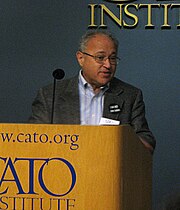David D. Friedman
From Wikipedia, the free encyclopedia

David Director Friedman (born February 12, 1945) is a writer who became a leading figure in the anarcho-capitalist community with the publication of his book The Machinery of Freedom (1973, revised 1989). He has also authored the books Price Theory: An Intermediate Text (1986), Law's Order (2000) and Hidden Order: The Economics of Everyday Life (1996).
Contents |
[edit] Life and work
| Part of the series on |
|
Movements
Organizations
Beliefs
People
Theories
Ideas
Topics
|
David Friedman is the son of economists Milton Friedman and Rose Friedman. His son, Patri Friedman, has also written on anarcho-capitalism topics, particularly seasteading. David Friedman holds a Ph.D. in Physics from the University of Chicago, although he is mostly known for his work in political theory and economics. He is currently a professor of law at Santa Clara University as well as a contributing editor for Liberty magazine. He is an atheist.[1]
[edit] Anarcho-capitalism
In his 1973 book The Machinery of Freedom, Friedman developed a form of anarcho-capitalism where all goods and services including law itself can be produced by the free market. This differs from the version proposed by Murray Rothbard, where a legal code would first be consented to by the parties involved in setting up the anarcho-capitalist society. Friedman advocates an incrementalist approach to achieve anarcho-capitalism by gradual privatization of areas that government is involved in, ultimately privatizing law and order itself. In the book, he states his opposition to violent anarcho-capitalist revolution.[2]
This consequentialist version of anarcho-capitalism has been called the "Chicago School" version.[3] Friedman's version of individualist anarchism is not based on the assumption of inviolable natural rights but rather rests on a cost/benefit analysis of state versus no state.[4] It is contrasted with the natural-rights approach as propounded most notably by Austrian School economist and libertarian theorist Murray Rothbard.
[edit] Non-academic interests
Friedman is a longtime member of the Society for Creative Anachronism, where he is known as Duke Cariadoc of the Bow. He is known throughout the worldwide society for his articles on the philosophy of recreationism and practical historical recreations, especially those relating to the medieval Middle East[5]. His work is compiled in the popular Cariadoc's Miscellany. He also founded the largest and longest-running SCA event, the Pennsic War; as king of the Middle Kingdom he challenged the East Kingdom, and later as king of the East accepted the challenge…and lost.[6]
He is a long-time science fiction fan, and has written a fantasy novel, Harald (Baen Books, 2006). He plays World of Warcraft.[7]
[edit] Bibliography
[edit] Nonfiction
- 1989 (1973). The Machinery of Freedom.
- 1990 (1986). Price Theory: An Intermediate Text Southwestern Publishing.
- 1996. Hidden Order: The Economics of Everyday Life.
- 2000. Law’s Order: What Economics Has to Do with Law and Why It Matters. Princeton Univ. Press.
- 2008. Future Imperfect: Technology and Freedom in an Uncertain World.
[edit] Fiction
- Harald, 2006
- Salamander, forthcoming
[edit] References
- ^ Friedman, David D. "Atheism and Religion", Ideas.
- ^ Friedman, David D. "Revolution Is the Hell of It". The Machinery of Freedom. pp. 149–150. ISBN 0-8126-9069-9.
- ^ Tame, Chris R. October 1983. "The Chicago School: Lessons from the Thirties for the Eighties". Economic Affairs. p. 56
- ^ Morris, Christopher. 1992. An Essay on the Modern State. Cambridge University Press. p. 62.
- ^ Friedman, David J. "On Restructuring the SCA"
- ^ F.L. Watkins (Fólki Þorgilsson). 2005. HERSTAĐR-SAGA: An Incomplete History of Pennsic © Folump Enterprises
- ^ Ideas: Wanted: The Inn Between the Worlds
[edit] External links
| Wikiquote has a collection of quotations related to: David Friedman |
- Homepage
- Ideas Friedman's blog
- David D. Friedman speech at Authors@Google
- David D. Friedman at the Internet Speculative Fiction Database
- An interview with David Friedman on The Marketplace of Ideas
|
|||||
|
||||||||||

